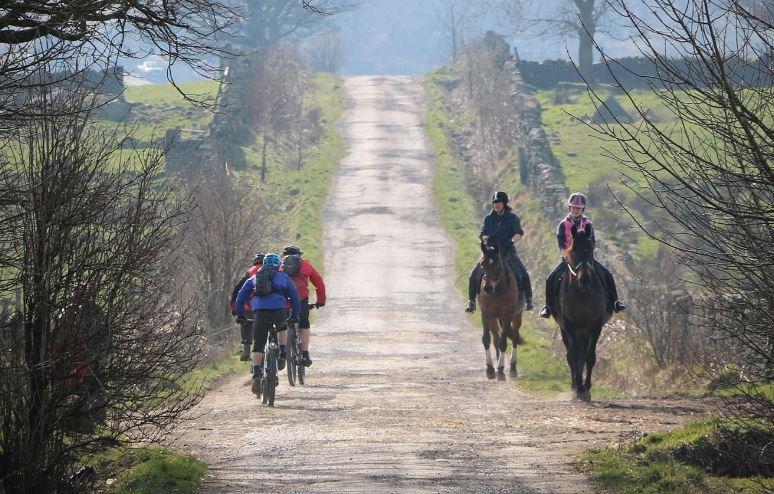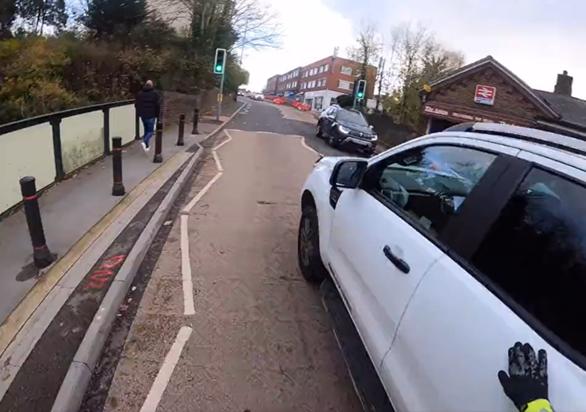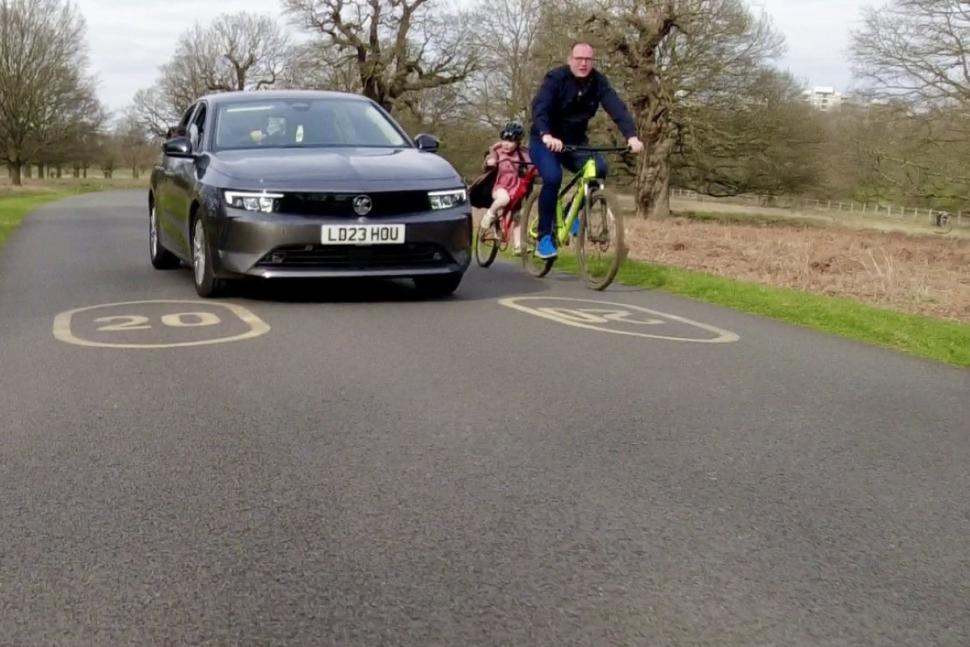- News
- Reviews
- Bikes
- Accessories
- Accessories - misc
- Computer mounts
- Bags
- Bar ends
- Bike bags & cases
- Bottle cages
- Bottles
- Cameras
- Car racks
- Child seats
- Computers
- Glasses
- GPS units
- Helmets
- Lights - front
- Lights - rear
- Lights - sets
- Locks
- Mirrors
- Mudguards
- Racks
- Pumps & CO2 inflators
- Puncture kits
- Reflectives
- Smart watches
- Stands and racks
- Trailers
- Clothing
- Components
- Bar tape & grips
- Bottom brackets
- Brake & gear cables
- Brake & STI levers
- Brake pads & spares
- Brakes
- Cassettes & freewheels
- Chains
- Chainsets & chainrings
- Derailleurs - front
- Derailleurs - rear
- Forks
- Gear levers & shifters
- Groupsets
- Handlebars & extensions
- Headsets
- Hubs
- Inner tubes
- Pedals
- Quick releases & skewers
- Saddles
- Seatposts
- Stems
- Wheels
- Tyres
- Health, fitness and nutrition
- Tools and workshop
- Miscellaneous
- Tubeless valves
- Buyers Guides
- Features
- Forum
- Recommends
- Podcast
 Cyclists and horses (licensed CC BY SA 2.0 on Flickr by Michael Podger)
Cyclists and horses (licensed CC BY SA 2.0 on Flickr by Michael Podger)Drivers “surprised and happy” to see horses on the road – but “frustrated, angry, and anxious” when overtaking cyclists, new road rage study finds
Motorists are most likely to experience feelings of surprise or happiness when encountering and having to overtake horses and horse riders on the road – but anger, frustration, and anxiety when faced with the same situation involving a cyclist, a new study examining the role of mindfulness when passing vulnerable road users has found.
The research, carried out on behalf of the British Horse Society, also found that 80 per cent of drivers agree that motorists are held up by cyclists when in a rush, while seven out of ten drivers surveyed agreed that cyclists are unpredictable, can appear from nowhere, and don’t obey road rules.
Published last week, the Road Safety Trust-funded project was undertaken by David Crundall, Editha van Loon, and Katherine Bailey from Nottingham Trent University, and surveyed over 1,000 drivers on how they feel, think, and behave around vulnerable road users such as cyclists and horse riders in a bid “to better understand their emotions, attitudes, and behaviours”.
> Cycling UK and British Horse Society issue guidance to cyclists on how to overtake horses safely
As part of the study, the 1,006 drivers from across the UK who took part in the online questionnaire were asked how often they feel a range of emotions – including frustration, happiness, surprise, anger, contempt, and anxiety – when “faced with cyclists, horse riders, or motorcyclists in the road ahead”.
32 per cent of those surveyed reporting feeling frustrated towards cyclists “often” or “nearly always”. 20 per cent, meanwhile, reported the same frequencies of anxiety around cyclists, and 16 per cent said they were often or nearly always angry at people on bikes on the road.
In comparison, only two per cent said they were often or nearly always angry when faced with horses and horse riders on the road (though those behind the study noted that this still amounts to 24 of the 1,006 drivers surveyed, described as a “sizeable minority with extreme views”).
Over three-quarters of those surveyed said they felt frustration towards cyclists at least sometimes, with almost half experiencing anger occasionally. Under a quarter of respondents, meanwhile, said they never or almost never felt angry when passing a cyclist on the road.
The motorists were then asked to share how often they engage in risky or aggressive behaviour around vulnerable road users. 24 per cent said they shout or gesticulate at cyclists at least sometimes, with two per cent admitting that they frequently or almost always shout at cyclists.
Around a quarter of the drivers also said they sometimes follow cyclists at or less than a car’s length behind them (with around 15 per cent revealing that they frequently or almost always follow cyclists at close proximity), with roughly the same number admitting they leave people on bikes less than 1.5m space when passing. 40 per cent admitted overtaking cyclists at or above the speed limit for the road.
Between 20 and 30 per cent of drivers also said they sound their horn or rev their engine at cyclists before passing them.
Horses, however, appear to evoke much fewer instances of negative behaviour, with an average of 97 per cent saying they never engage in aggressive behaviour towards the animals and their riders on the road.
> Look out for horses — here's how to pass horse riders safely
Finally, when focusing on attitudes towards cyclists, 81 per cent said they strongly or somewhat agree that drivers may be in a rush and are held up by cyclists, while around 70 per cent agreed that cyclists are “unpredictable” and “can appear from nowhere”.
68 per cent also agreed with the statement that “cyclists don’t obey road rules” and around 55 per cent agreed that drivers may be stressed about something else and take it out on cyclists, that packs of leisure cyclists can be intimidating, and that cyclists “act arrogantly”.
Just under half (48 per cent) also strongly or somewhat concurred that cyclists should pay “road tax” (despite the fact it doesn’t exist) and 26 per cent agreed that cyclists “shouldn’t be on the roads”.
In their free-form text responses to the questionnaire, some drivers expressed annoyance that cyclists “are slowing down traffic”, with one noting that “I am often in a rush and with time deadlines to get somewhere, so the hold-up of staying behind a cyclist holds me up far too long”.
Road position and riding two-abreast also formed a significant portion of the responses, with some arguing that “commuting cyclists… ride in the middle of the road making it hard to pass” and that “cyclists are very rude and ride in the middle of the road so that you can’t overtake”.
“Recreational expert cyclists often ride deliberately next to each other to slow other [road] users down,” another respondent said.
Other responses were even more forthright, and included claims that cyclists – or “Lycra warriors”, as one respondent described them – “are selfish and dangerous and think they own the road at times” and are “arrogant arseholes”.
“When there is a cycle path and it’s not being used, we always shout ‘use the cycle path psychopath!’” one of the motorists added.
This data was subsequently assessed by mindfulness experts, with a group of drivers then treated to a four-week training intervention, where they were shown newly crafted scripted videos which aimed to tackle a lack of knowledge about unsafe passing behaviours by providing information on how to overtake vulnerable road users, provide persuasive arguments to reframe motorists’ attitudes towards cyclists, and offer mindfulness techniques to combat in-the-moment emotions such frustration and anger.
According to the report, the four videos had a positive effect on the attitudes and emotions, particularly concerning frustration, of the drivers towards cyclists, and that their intended future overtaking speeds have decreased, along with a decrease in their unsafe passing behaviours.
The motorists who took part in the online course also said the videos would be of great benefit for other drivers, reckoning that their knowledge, attitudes, and level of control when overtaking had improved, and that they would use the recommended safe passing and mindfulness techniques in practice.
After obtaining a PhD, lecturing, and hosting a history podcast at Queen’s University Belfast, Ryan joined road.cc in December 2021 and since then has kept the site’s readers and listeners informed and enthralled (well at least occasionally) on news, the live blog, and the road.cc Podcast. After boarding a wrong bus at the world championships and ruining a good pair of jeans at the cyclocross, he now serves as road.cc’s senior news writer. Before his foray into cycling journalism, he wallowed in the equally pitiless world of academia, where he wrote a book about Victorian politics and droned on about cycling and bikes to classes of bored students (while taking every chance he could get to talk about cycling in print or on the radio). He can be found riding his bike very slowly around the narrow, scenic country lanes of Co. Down.
Latest Comments
- HalfDanHalfBiscuit 2 hours 49 min ago
Per capita thefts isn't all that useful a metric as it doesn't take into account levels of bike ownership. Cambridge is probably the cycling...
- Critman 4 hours 15 min ago
"30mm outer diameter 18mm inner diameter 13.4mm". Good luck finding a skinny tire.
- Destroyer666 5 hours 43 min ago
Ahem, the recommended lockring is just a common through-axle specific lockring, so nothing Miche specific there, and the required tool for it is an...
- Destroyer666 6 hours 38 min ago
Nonono, not those, but those that have constructed Italian cars and motorcycles that have been driven to hundreds of race and championship...
- RoubaixCube 6 hours 47 min ago
This may well be the case although Im unaware of the brands popularity on their home turf. I used to see them being advertised more in the UK...
- qwerty360 7 hours 17 min ago
Arguably sticking it in a bank account is bad....
- Sredlums 8 hours 16 min ago
I'd counter that those brakes were in fact so inadequate that they eventually developed a whole new type of bicycle that was actually suited for it...
- levestane 8 hours 18 min ago
Unfortunately, Africa is heavily exploited both for resource extraction...
- CitizenSmith 8 hours 44 min ago
There seems to be no support for TOO) now - their email and website are defunct. They are inactive on Facebook. Aftter less than a year the rails...


Add new comment
107 comments
I'm waiting for the updated road.cc review criteria which assesses new bikes according to their weight, riding pleasure, comfort, price, and ability to teleport
extra points for elecronic vs manual teleporting of course. I heard that *insert name of bike manufacturer* are bringing out 14 speed Di2 teleportation on some new models. With disc brakes obviously, I mean you'd need some serious rim brakes to cope with that.
Gravel specific version to be available within months.
Would I be able to teleport from Preston to Essex?
I hope the UCI ban such devices, or Grand Tour spectating could become quite dull.
even more so?
Just make sure there are no flys on the bike before teleporting. bad things can happen.
I just need to arrange for drivers to pull out without looking properly at my workplace just as I am leaving home, so I can appear from nowhere instead of actually having to travel between two locations.
Deep down, even the biggest petrolhead knows that cars are massive local polluters, contribute not insignificantly to global warming, and kill thousands per year. They certainly must be conscious of the fact that, the moment they bought their first car, they essentially opened their wallets for the petrochemical industry, the insurance industry, and the government to take as much as want out whenever they feel like it. And they know that cycling is, or could be, a viable alternative for most people. But nobody, on any level, feels embarrassed that they aren't riding a horse to work.
I would also assume that riding horses takes a long time to learn and costs more (in terms of horse maintenance etc) than riding a bike.
So some drivers might actually be jealous of us cyclists who have chosen the cheaper and easier option
We are also showing drivers that we aren't as scared of cycling on roads as they probably are.
I don't think they know or accept those things at all.
100 years of big auto and big oil
propagandamarketing will do that!Were the same drivers tested on their knowledge of the highway code?
It would be interesting if those included in the survey were also asked some questions as to how they rated themselves as drivers and their driving behaviours. The correlation of answers would be interesting.
I've been tempted to have a sign made up to stick on my back that asks motorists to 'pass me like you'd pass a horse' but then I looked up the stats and was surprised at how many collisions there where involving motorists and horses and their riders.
i still believe that motorist's behaviour towards horses is nothing to do with them caring more about them but more to do with assessing the potential risk a horse could do to the motorist's vehicle if spooked.
Don't wear that round the New Forest...
100% agree.
A startled horse is likely to cause much more damage to a vehicle than if a driver hits a cyclist.
And drivers know it.
Reciprocal Road danger has safety value.
HazChem signs are available and required for the safe transport on the public highway depending upon the chemical you may transport.
For example Corrosive or Explosive or Inflamable. Your choice..
Pages